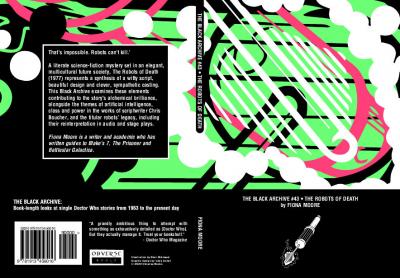Black Archive #43 - Robots of Death
Sunday, 17 May 2020 - Reported by Marcus
 The latest release in the Black Archive series looks at the Fourth Doctor story Robots of Death.
The latest release in the Black Archive series looks at the Fourth Doctor story Robots of Death. The series, from Obverse Books, explores in detail the making of the story first shown in 1977.
That's impossible. Robots can't kill.
A literate science-fiction mystery set in an elegant, multicultural future society, The Robots of Death (1977) represents a synthesis of a witty script, beautiful design and clever, sympathetic casting.
This Black Archive examines these elements contributing to the story’s alchemical brilliance, alongside the themes of artificial intelligence, class and power in the works of scriptwriter Chris Boucher, and the titular robots’ legacy, including their reinterpretation in audio and stage plays.
Asked why she chose Robots, Fiona said
I have been fascinated by it since I first saw it during the late 1980s. At a time when even the best of 1970’s TV appeared “dated” rather than “retro,” The Robots of Death stood out because it looked, and sounded, fresh and timeless. Many of my interests as a SF historian and critic may well owe their inspiration to The Robots of Death: the influence of Expressionism; the representation of women and ethnic minorities in SF television; the ambivalence humans feel about robots; and how SF deals allegorically with class, power, and capitalism.
I’m delighted to have the opportunity to explore these concepts in more detail through writing for The Black Archive.
Fiona Moore is a writer and academic who has written guides to Blake’s 7, The Prisoner and Battlestar Galactica.
Order on AmazonA literate science-fiction mystery set in an elegant, multicultural future society, The Robots of Death (1977) represents a synthesis of a witty script, beautiful design and clever, sympathetic casting.
This Black Archive examines these elements contributing to the story’s alchemical brilliance, alongside the themes of artificial intelligence, class and power in the works of scriptwriter Chris Boucher, and the titular robots’ legacy, including their reinterpretation in audio and stage plays.
Asked why she chose Robots, Fiona said
I have been fascinated by it since I first saw it during the late 1980s. At a time when even the best of 1970’s TV appeared “dated” rather than “retro,” The Robots of Death stood out because it looked, and sounded, fresh and timeless. Many of my interests as a SF historian and critic may well owe their inspiration to The Robots of Death: the influence of Expressionism; the representation of women and ethnic minorities in SF television; the ambivalence humans feel about robots; and how SF deals allegorically with class, power, and capitalism.
I’m delighted to have the opportunity to explore these concepts in more detail through writing for The Black Archive.
Fiona Moore is a writer and academic who has written guides to Blake’s 7, The Prisoner and Battlestar Galactica.
















